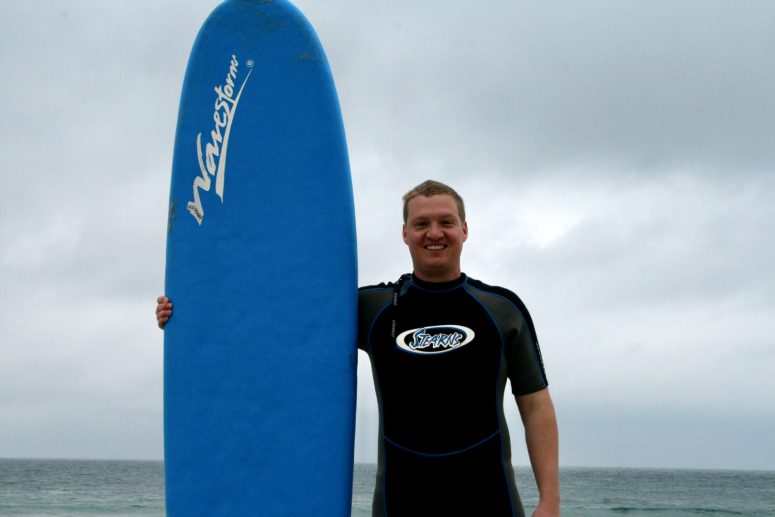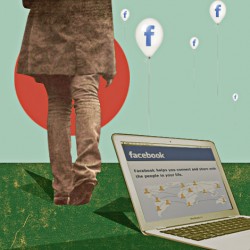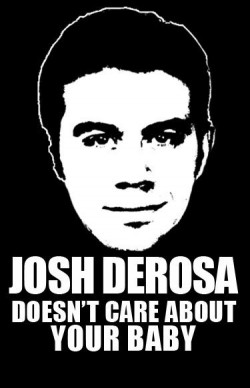
My first time surfing (in San Diego): What I looked like days after quitting Facebook
10 years ago to the day, I quit Facebook. At the time I feared I might be committing social suicide. Today, I can happily report that didn’t happen.
Since quitting the popular boomer hangout, I’ve limited the number of work and out of office distractions I encounter. I no longer feel the desire to “check in” online at every waking hour. It takes me longer to discover new bands. And I don’t have to consciously decide or distinguish friends from colleagues, associates, and nobodies. I just let them happen naturally now; unannounced and always evolving.
Continue reading…

Blake Snow
I quit social media four years ago. By that I mean I quit Facebook, Twitter*, Google+, LinkedIn and other “social networks” that require the declaration and management of electronic relationships. Since then, my personal and professional lives have been greatly enriched. So much so, I don’t plan to join digital social networks ever again. (More on that here.)
Unless, of course, those networks can enhance my physical relationships. Consider, for example, Google Hangouts, an ad-hoc social network. After reluctantly declining six months of invites, my wife recently convinced me to join. I’m glad I did. It’s allowed me to stay in close touch with extended family without colleagues, associates, admirers, like-minded people, or old high school acquaintances getting in the way. It’s also let me indulge in animated gifs.
But even this endearing network has become a distraction at times. By my own doing, it’s sometimes made me lose sight of the big picture. Continue reading…
NBC/KSL—Like AOL before it, Facebook is the latest in a long line of mainstream technologies to introduce a lot of new users to the power, utility, and network effect of the Internet.
At the same time, the popular hangout has negatively impacted the number of public comments taking place online. Case in point: The number of people making online remarks has dwindled from a record 15% five years ago to an estimated 7% last year, according to market research by Nielson.
The reason: “Conversations around stories are moving off the news page and onto social networks,” says Steve Rubel, a longtime observer of social media since 2004. “With time spent on social networks like Facebook skyrocketing, it leaves little left to engage at the source of the news.”
Is that a problem? Continue reading…
Facebook is a great way to stay connected with friends. It’s also a great way to stay connected with people you wouldn’t have otherwise, resulting in added noise and unwanted drama. Which is why I deleted all my “friends” and updated my status to the following:
“Blake Snow is currently on Facebook hiatus. (Pretty cool, no?) If you’d like to get in touch—either by email, status updates, RSS, or his blog—please visit his website. Or just talk to him the next time you see him.”
Why hiatus instead of deletion? Because Facebook has more than 300 million members, so it seems insular of me to completely disregard it. As is, I have the option to resume my account, and I still benefit from redirected search traffic. Will I ever come back? That’s the great thing about being on hiatus—I can defer my decision indefinitely.
Any predictions on how this experiment might conclude? Social suicide? Professional setback? Or better productivity and greater independence?
 Facebook is a great way to stay connected with friends.
Facebook is a great way to stay connected with friends.
It’s also a great way to get fired, have your insurance benefits revoked, or suffer public humiliation. As a result, a number of users are deleting their accounts and leaving the popular networking site behind.
For good.
“It just became too much,” says grade-school buddy and long-time friend Josh Rhine. “More an obligation than fun. It also started to smell like some one cracked an egg of high school over an old gossip rag.”
Continue reading at VentureBeat…



 From one of the most brilliant minds of our time comes…
From one of the most brilliant minds of our time comes…